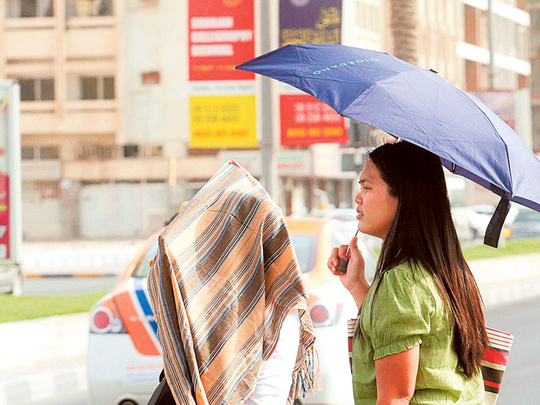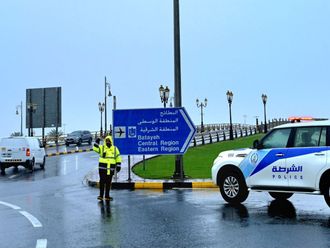
Dubai: Residents have been advised to take extra precautions to avoid heat-related illnesses as the mercury rises above 40 degree Celsius and nears 50C in some areas in the UAE.
Forecasters at the National Centre of Meteorology and Seismology on Thursday said the weekend will be hot in general with internal areas getting the maximum temperatures of between 44C and 49C. The mercury will slide down a bit to 39C to 44C along the coast and further down to 33C to 37C in mountain areas.
The highest temperature in the UAE on Wednesday was recorded in Mezaira at 49.6C at 3pm. Internal areas usually record the highest temperatures during summer.
An expected increase in relative humidity reaching 80 to 100 per cent will contribute to the feeling of discomfort from midnight to early morning for those who go outdoors.
“This temperature range is common in the UAE during this period. Between June and end of August, the temperature is normally above 40C and slightly above 50C,” a forecaster told Gulf News.
“This temperature may be the same in other countries right now [where heatwaves are becoming more extreme and deadly] but that could be due to other factors like lack of drinking water and other medical reasons. I cannot comment on it,” he added.
Dr Arun Kumar Sharma, consultant neurologist at Medeor 24X7 Hospital Dubai, said residents should take extra precautions when going outdoors.
“Residents should stay indoors as much as possible, especially during the hottest times of the day usually between noon and 3pm. They should wear all types of protective clothing — face covers and sunglasses. If they have to stay out for a long time, use an umbrella,” Dr Sharma said.
Besides taking these precautions, Dr Sharma said caring for the body internally is also key.
“Before stepping out, hydrate yourself by drinking at least two litres of water. And since electrolytes also go down, the simple electrolyte solution would be a bit of lemon and half a teaspoon of salt that contains potassium and sodium. You don’t have to go searching for commercial electrolyte solutions.”
Dr Sharma said those who are fasting may keep themselves hydrated by consuming foods that have high water content such as fruits and vegetables during iftar. When faced with an option between greasy foods and a salad, choose the latter.
When a person feels a steady increase in body temperature when outdoors, he should immediately seek shade where possible. He can also try water sponging but if it’s an actual heatstroke, he will require intensive treatment by medical professionals.
TOP TIPS FOR SUMMER
Stay indoors whenever possible from noon until around 3pm.
Wear sunscreens and protective clothing. Use an umbrella, it’s not a crime.
Keep yourself hydrated by drinking lots and lots of water.
Consume water-rich foods such as fruits and vegetables.
Wear light clothing made of breathable fabric.












